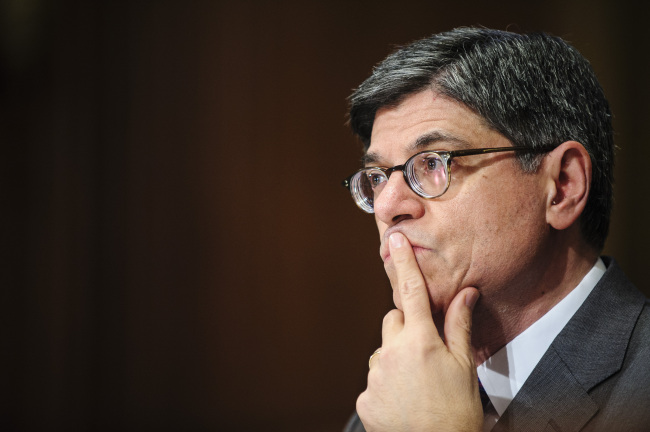U.S. Treasury Secretary Jacob Lew urged Group of 20 officials to maintain a pledge to refrain from influencing exchange rates at the expense of other countries, saying Japan’s recent policies align with the pact.
“We will continue to press G20 countries to avoid a downward spiral of ‘beggar thy neighbor’ policies,” Lew said Wednesday in Washington ahead of this weekend’s meetings of finance ministers starting tomorrow. “It is imperative that all G20 countries follow through on their recent commitment not to target exchange rates for competitive purposes.”
Answering questions after the speech, Lew said the Bank of Japan’s plan for record monetary easing is in accord with G20 agreements, adding that “we’re watching pretty closely” the effects of the policy. The yen has fallen for six straight months against the U.S. currency.
 |
U.S. Treasury Secretary Jacob Lew. (Bloomberg) |
“Japan has had problems with domestic demand for some time and to the extent that they are targeting their policies and encouraging domestic demand with domestic tools, we think that is very much consistent” with international pledges, Lew said.
While the G20 made the pledge at a meeting in Moscow in February and didn’t single Japan out for allowing the yen to drop, the U.S. Treasury on April 12 urged Japan to refrain from competitive devaluation. It stopped short of declaring either Japan or China currency manipulators.
The Bank of Japan surprised markets on April 4 by doubling monthly bond purchases to almost match the Federal Reserve’s monetary easing, and by setting a two-year horizon for achieving its goal of 2 percent inflation.
European Central Bank President Mario Draghi and Bank of Canada Governor Mark Carney this week signaled they back Japan’s stimulus as aimed at rallying its economy, indicating there won’t be much of a fight at the G20.
The yen weakened Wednesday as investors speculated that Japan will escape G20 criticism of monetary policies that have contributed to the currency’s 11.4 percent decline this year against the U.S. dollar.
Speaking about China in his prepared remarks, Lew reiterated the country needs to allow further yuan appreciation.
“We are concerned that in recent months, movement towards more currency flexibility appears to have slowed,” Lew said at Johns Hopkins University’s School of Advanced International Studies. “The pace of China’s intervention in the market has picked up.”
Lew said the world needs stronger economic growth and pointed to a need for more robust demand in Europe.
Europe must decide “how to better balance the pace of fiscal consolidation with the need for growth, and how to ensure that surplus countries contribute more to demand as deficit countries undergo adjustment,” Lew said.
Lew expressed support for a “full” euro-area banking union, with a single supervisory mechanism, resolution authority and recapitalization capacity and said the recent Cyprus crisis emphasized the need for such a framework.
(Bloomberg)







![[Weekender] Korea's traditional sauce culture gains global recognition](http://res.heraldm.com/phpwas/restmb_idxmake.php?idx=644&simg=/content/image/2024/11/21/20241121050153_0.jpg)
